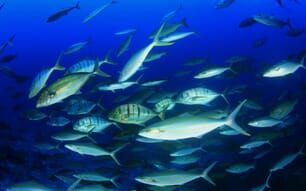The new policy includes a landing obligation which requires that fishermen land any undersized and non-marketable fish they catch. This will make it possible to obtain a better overview of the offshore fish stocks and to optimise these stocks.
The partner agreements concluded earlier have now become sustainable partnership agreements in order to promote sustainability in developing countries. Partner countries will be compensated for granting EU countries access to their waters and they will receive financial support for implementing a sustainable fisheries policy. This agreement does have a negative consequence in that fish caught by European fishermen will usually be consumed in the European market and not in the partner country itself. The agreement offers a guarantee to developing countries that their resources will be utilised in the same way as European resources.
In addition to fisheries, the reformed CFP also stimulates sustainable European aquaculture. The EU is highly dependent on imports, and for this reason it is important that sustainable production be increased. Given the available space and the climate, this will not result in increased competition for aquaculture from developing countries. Enabling a transparent and efficient internal market is a priority. This can be achieved by improving quality marks and labelling. This will result in more awareness on the part of the consumer and improved quality, traceability and food security.
Illegal fishery
Illegal, unreported and unregulated fishery is a major threat to the sustainable use of aquatic resources. Since January 2010, fishermen have been required to submit catch certificates when exporting fish. Monitoring has been intensified, and fish products from vessels or countries on the IUU list are stopped at the European border. This has significant economic consequences.
General System of Preference
The EU's General System of Preference (GSP) currently has three variants: GSP, GSP+ and Everything-But-Arms. In this system, developing countries pay a lower VAT for their exports to the EU, which is important for their economic growth. The reforms to the policy and the resulting stricter criteria mean that a number of countries no longer receive preferred market access; this is known as 'country graduation'. The number of countries with preferred market access has gone from 170 to 80. The list of products which can be traded under the GSP system has also changed; this is known as 'product graduation'. The GSP system is intended to protect EU fishermen against competition on the one hand and to meet the clear need on the other hand that fish from developing countries fulfil EU standards.
In cooperation with the Centre for the Promotion of Imports from developing countries (CBI), LEI Wageningen UR has investigated what the changes to EU policy entail and what the consequences will be for SMEs in developing countries which export to the European market. A detailed overview can be found in the attached document.


